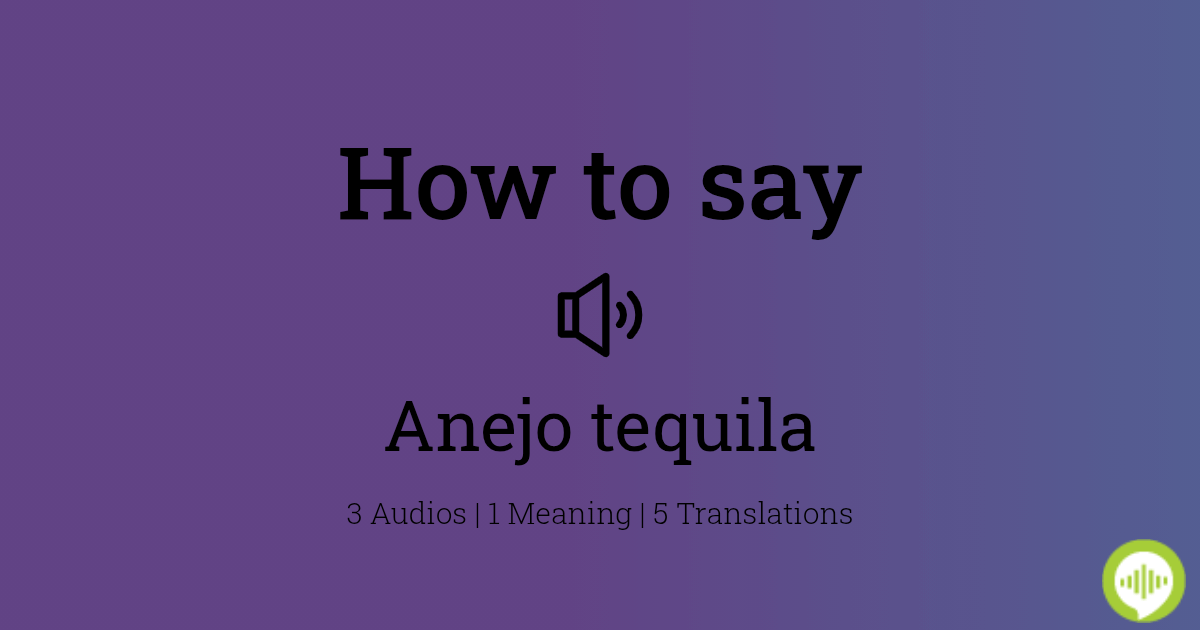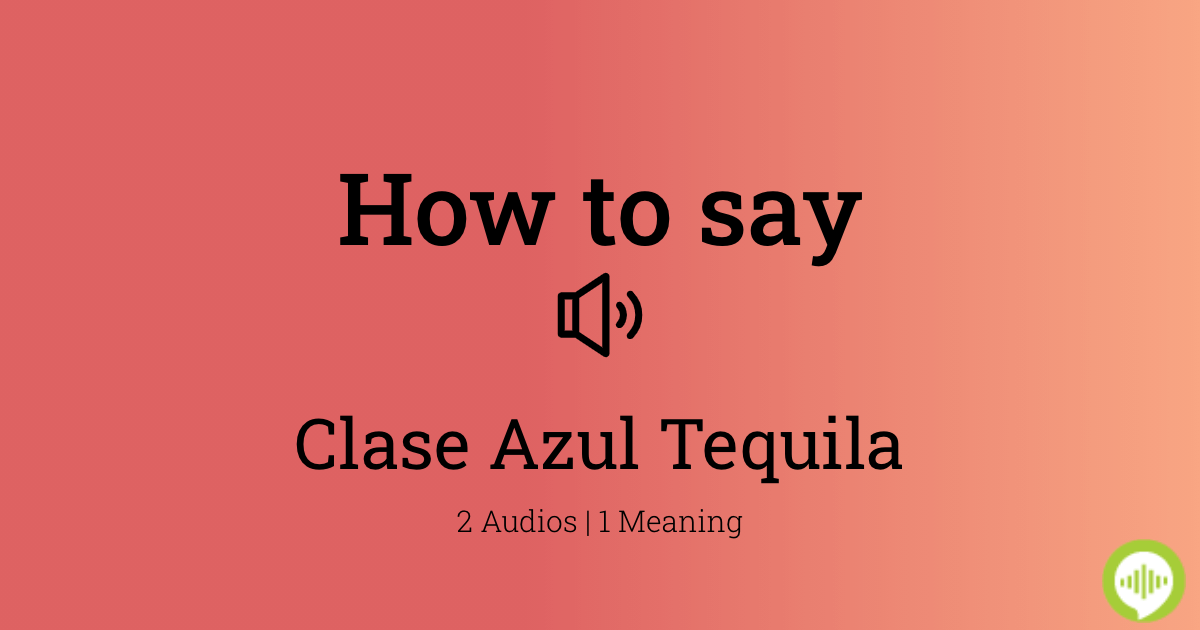Tequila is one of the most iconic spirits in the world, yet many people struggle with how to pronounce it correctly. Whether you're a tequila enthusiast or simply someone who enjoys a good margarita, knowing the proper pronunciation can enhance your confidence when ordering or discussing this beloved Mexican spirit. This guide will walk you through everything you need to know about pronouncing "tequila" like a pro.
Learning the correct pronunciation of tequila not only improves your conversational skills but also shows respect for the culture and history behind this drink. Tequila has deep roots in Mexican tradition and is a source of national pride for many. By mastering its pronunciation, you demonstrate an appreciation for the spirit's origins and significance.
In this article, we'll explore the nuances of tequila pronunciation, provide tips for mastering it, and delve into the cultural and historical context that makes tequila such a fascinating subject. Let's dive in and discover how to pronounce tequila with confidence!
Read also:Savannah Humane Society A Beacon Of Compassion For Animals
Table of Contents
- The Origin of Tequila and Its Pronunciation
- Phonetic Breakdown of Tequila
- Common Mistakes in Pronouncing Tequila
- Tips for Perfecting Your Pronunciation
Cultural Significance of Tequila Pronunciation
- A Brief History of Tequila
- Types of Tequila and Their Pronunciations
- Language Influence on Tequila Pronunciation
- Expert Advice on Pronouncing Tequila
- Frequently Asked Questions About Tequila Pronunciation
The Origin of Tequila and Its Pronunciation
Tequila originates from the town of Tequila, located in the state of Jalisco, Mexico. The name itself is believed to come from the Nahuatl word "tequitl," which means "work" or "labor." Understanding the origin of the word can help in grasping its correct pronunciation. The authentic pronunciation reflects the phonetic sounds of the Spanish language, as tequila is a Spanish term.
In Spanish, the stress falls on the second-to-last syllable, which is a key aspect of pronouncing tequila correctly. This emphasis on the "qui" sound gives the word its distinctive rhythm and melody. By recognizing the linguistic roots of tequila, you can better appreciate its pronunciation and the cultural heritage it represents.
Phonetic Breakdown of Tequila
To master the pronunciation of tequila, it's essential to break down the word phonetically:
- Teh: The first syllable is pronounced like the English word "teh," with a soft "t" sound.
- Ke: The second syllable sounds like "keh," where the "k" is pronounced clearly.
- La: The final syllable is pronounced as "lah," with a short "a" sound.
When combined, the pronunciation flows as "teh-KEE-lah." Paying attention to these individual sounds will help you pronounce tequila accurately and confidently.
Common Mistakes in Pronouncing Tequila
Many people make errors when attempting to pronounce tequila. Here are some of the most common mistakes:
- Incorrect stress placement: Some individuals place the stress on the first syllable, saying "TEH-kee-lah" instead of "teh-KEE-lah."
- Anglicizing the pronunciation: Others may pronounce it as "teh-KWEE-luh," which is closer to an English adaptation rather than the authentic Spanish pronunciation.
- Omitting the final "ah" sound: Failing to pronounce the "lah" at the end can result in an incomplete or incorrect pronunciation.
Avoiding these mistakes will ensure that your pronunciation aligns with the original Spanish version.
Read also:Deep Sea Headquarters Exploring The Mysteries Beneath The Waves
Tips for Perfecting Your Pronunciation
Here are some practical tips to help you perfect your tequila pronunciation:
- Listen to native speakers: Watching videos or listening to audio clips of native Spanish speakers can provide valuable insight into the correct pronunciation.
- Practice regularly: Repeatedly saying the word aloud will help reinforce the proper sounds and rhythm.
- Use phonetic guides: Referencing phonetic breakdowns, as outlined earlier, can serve as a helpful reference point.
By incorporating these strategies into your practice routine, you'll soon find yourself pronouncing tequila with ease and confidence.
Cultural Significance of Tequila Pronunciation
Tequila holds immense cultural significance in Mexico, where it is celebrated as a symbol of national identity. Properly pronouncing tequila demonstrates respect for this cultural heritage and acknowledges the rich history behind the spirit. Understanding the cultural context adds depth to your appreciation of tequila and enhances your ability to engage in meaningful conversations about it.
A Brief History of Tequila
Tequila's history dates back centuries, with its roots tracing to the indigenous people of Mexico who produced a fermented beverage called pulque. The Spanish conquistadors introduced distillation techniques, leading to the development of mezcal, the precursor to modern tequila. Over time, tequila emerged as a distinct category of spirits, distinguished by its use of blue agave as the primary ingredient.
This historical evolution underscores the importance of respecting tequila's origins and traditions, including its correct pronunciation. By honoring this legacy, you contribute to preserving the cultural significance of tequila.
Types of Tequila and Their Pronunciations
There are several types of tequila, each with its own unique characteristics:
- Blanco/Plata: Pronounced "BLAN-koh" or "PLAH-tah," this is unaged tequila that showcases the raw flavors of blue agave.
- Reposado: Pronounced "reh-poh-SAH-doh," this tequila is aged for a minimum of two months, resulting in a smoother taste.
- Añejo: Pronounced "ah-NEH-hoh," this tequila is aged for at least one year, developing complex flavors and aromas.
Familiarizing yourself with these varieties and their pronunciations enriches your knowledge of tequila and enhances your conversational expertise.
Language Influence on Tequila Pronunciation
The pronunciation of tequila is heavily influenced by the Spanish language, which places emphasis on specific syllables and uses distinct phonetic sounds. Understanding the linguistic nuances of Spanish can aid in mastering tequila's pronunciation. For instance, the "qu" combination in Spanish is pronounced as "k," and the "i" sound is pronounced like "ee."
By recognizing these language patterns, you can more accurately replicate the authentic pronunciation of tequila.
Expert Advice on Pronouncing Tequila
According to language experts and sommeliers, the key to pronouncing tequila correctly lies in focusing on the stressed syllable and maintaining the proper vowel sounds. They recommend listening to recordings of native Spanish speakers and practicing consistently to internalize the pronunciation.
Additionally, experts emphasize the importance of cultural sensitivity when discussing tequila. Pronouncing it correctly demonstrates an understanding and appreciation of its cultural origins.
Frequently Asked Questions About Tequila Pronunciation
How important is it to pronounce tequila correctly?
Pronouncing tequila correctly shows respect for its cultural origins and enhances your credibility when discussing the spirit. While minor variations may be acceptable, striving for accuracy demonstrates attention to detail and cultural awareness.
Are there regional differences in tequila pronunciation?
While the standard pronunciation is "teh-KEE-lah," slight regional variations may exist. However, the emphasis on the second syllable and the distinct vowel sounds remain consistent across most Spanish-speaking regions.
Can I use an Anglicized version of tequila in casual conversation?
While using an Anglicized version may be acceptable in informal settings, opting for the authentic pronunciation whenever possible reflects a deeper appreciation for tequila's cultural significance.
Where can I find resources to improve my tequila pronunciation?
Online language resources, audio clips, and pronunciation guides can provide valuable tools for refining your tequila pronunciation. Engaging with native Spanish speakers or participating in language exchange programs can also enhance your skills.
Conclusion
Mastering the pronunciation of tequila is an essential step in appreciating this iconic spirit fully. By understanding its phonetic breakdown, recognizing common mistakes, and practicing regularly, you can confidently pronounce tequila with accuracy and respect for its cultural origins. Remember, the correct pronunciation not only enhances your conversational skills but also demonstrates an appreciation for the rich history and traditions behind tequila.
We invite you to share your thoughts and experiences in the comments section below. Have you encountered any challenges in pronouncing tequila? What strategies have you found most effective in improving your pronunciation? Additionally, explore our other articles to deepen your knowledge of tequila and its fascinating world.



